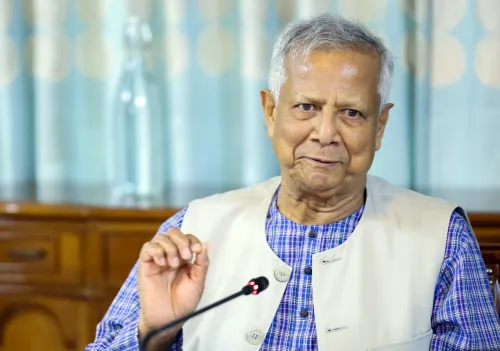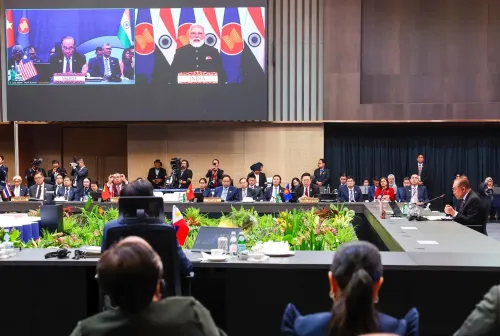Did PM Anthony Albanese's Labor Party Secure a Historic Victory in Australia?

Synopsis
Key Takeaways
- Historic victory for Anthony Albanese's Labor Party.
- Unprecedented second-term win since 2004.
- Labor projected to secure at least 87 seats.
- Peter Dutton loses his seat in a historic defeat.
- Mandatory voting system in place for all Australians.
Canberra, May 4 (NationPress) Prime Minister Anthony Albanese's centre-left Labor Party has achieved a remarkable second term in Australia's federal election.
On Saturday night, the Labor Party successfully retained power with a historic landslide victory, projected to give the party its highest number of seats in the lower house of the federal parliament, where government is formed, according to the Australian Broadcasting Corporation (ABC).
This victory marks Albanese as the first leader of any major party to win consecutive elections since 2004, as reported by Xinhua news agency.
In his victory speech at a Labor gathering in his hometown of Sydney, Albanese expressed that serving as Prime Minister is the greatest honor of his life.
"Australians have opted to confront global challenges in the Australian way, prioritizing mutual support while planning for the future," he said.
Albanese promised to "govern for all Australians" and emphasized that the re-elected government would dedicate "every day" of the next three years to earning back voters' trust.
"We undertake this mission with renewed hope, confidence, and determination. Together, we are turning a corner and will advance collectively," he asserted.
"This is a moment of profound opportunity for our nation. We possess everything necessary to seize this moment and make it ours, but we must do it together."
As of 10:45 p.m. local time, the ABC projected that the Labor Party was on track to win at least 87 out of 150 seats in the lower house of the 48th Parliament, surpassing the previous record of 86 seats achieved in 1986.
The official count from the Australian Electoral Commission indicated that Labor was ahead of the conservative Coalition of the Liberal and National Parties by 56.4 to 43.6 on a two-party basis as of Saturday night, with voters showing a nationwide preference for the government.
Among the seats won by Labor was Dickson in Brisbane's north, previously held by Opposition leader Peter Dutton since 2001.
This defeat makes Dutton the first Opposition leader to lose his seat in a federal election in Australian history.
The ABC reported that the opposition Coalition was likely to secure at least 39 lower house seats, with 12 assigned to minor parties and Independents, while the remaining 12 seats were still uncertain.
Speaking to supporters at an election night event in Brisbane earlier, Dutton acknowledged his defeat and stated he had called Albanese to concede.
"We did not perform well enough during this campaign, and I accept full responsibility," he added.
Dutton's defeat in Dickson implies that members of the Liberal Party, the senior partner in the coalition, will need to elect a new party leader to serve as the Opposition leader in the 48th Parliament.
On Saturday, polls opened at over 7,000 locations across Australia, where voters decided whether Albanese's centre-left Labor Party would govern for a second term or if the conservative Coalition of the Liberal and National Parties, led by Dutton, would take power.
Voting is mandatory for all Australian citizens aged 18 and older who are registered on the electoral roll maintained by the Australian Electoral Commission, with non-compliance resulting in minor administrative fines.
During federal elections, Australians complete two ballots, one for the lower house, known as the House of Representatives, and another for the upper house, the Senate.
All 150 seats in the lower house will be contested, along with 40 out of 76 seats in the Senate.
Each lower house seat represents an electorate, which consists of geographic divisions with nearly equal voter populations, while Senators represent their respective state or territory.









